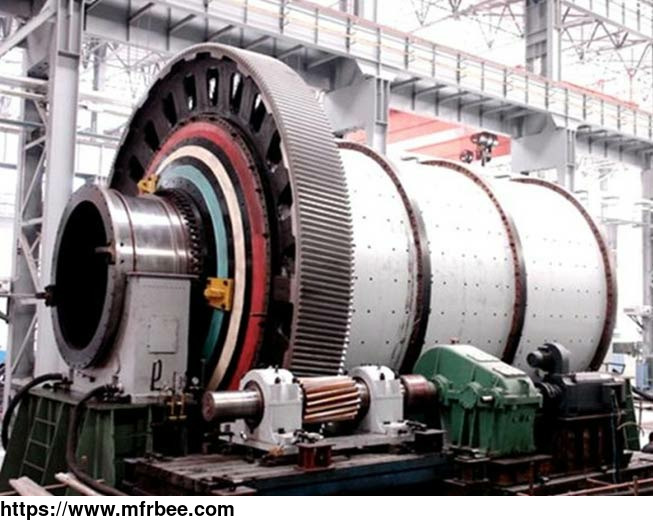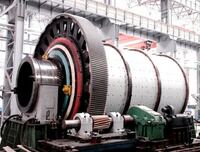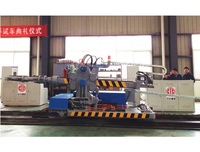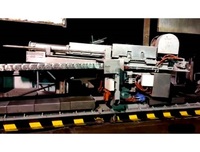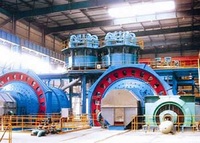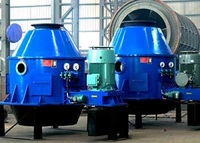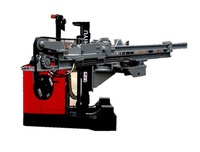Rod Mill
Specifications
Rod mill is very similar to ball mill except for the use of steel rods as grinding media. Steel rods grind the ore by rolling and rotating in the rod mill. The feeding of rod mill is about 50 mm
and the output particle size is between -4 and 35 mesh. Inquiry competitive rod mill price directly from rod mill manufacturers.
Application Fields of Rod Mill
Rod mills are one of the heavy equipment machinerys widely used for mine, cement, silicate products, steel slag, construction materials, refractory materials, fertilizers, glass, ceramics and other
materials.
Used for grinding rare metal ore
Rod mill is applied to the gravity separation or magnetic separation plant of tungsten tin ore and other rare metal ores to prevent over-crushing.
In the first grinding stage
The production capacity will be larger and the efficiency will be higher if the rod mill is used for the first stage industrial grinding mill to grind materials from 20~6 mm to 3~1 mm in the
two-stage grinding process.
Cone crusher can be replaced for fine crushing
The short-head cone crusher can be replaced by the rod mill for fine crushing in some cases. Rod usage of rod mill is simpler and cheaper than a closed circuit formed by the short-head cone crusher
and the sieve when processing 19-25 mm (or even 32 mm) to 6-10 mesh soft ores (especially viscous ores).
Advantages of Rod Mill
Saving power
The rods have a screening effect on the materials in the process of movement, which can make the large particle material be lifted to the high position of each layer and concentrated to the place
with strong crushing ability. Therefore, the high work efficiency and the low power consumption is obtained.
Few over-crushing
It is first crushed into coarse particles and second ground into smaller ones when the ore is ground by the steel rods, thereby the risk of over-crushing is reduced.
More uniform discharge size
The surface contact of traditional ball mill is changed to rod mill liners contact by rod mill.
The coarse particles are sandwiched between rods and liner when the rod rotates and rises along with the liner, making the fine particles to pass through the gap of rods, which is conducive to
crushing coarse particles, so the coarse particles are concentrated in the place where the grinding medium hits. So it is suitable for ores with different hardness (Mohs hardness 5.5~12) due to
more uniform and lighter over-crushing rod mill product.
Adjustable discharge fineness
There are two devices which work at the same time is a fineness control device and a screening device for discharging inside the rod mill, so the particle size of the material produced by the rod
mill can be adjusted according to the needs of user.
The size of ground particles can be ensured effectively because smaller mineral particles can be obtained by adjusting size.
Structure & Working Principle of Rod Mill
The rod mill is driven by the motor through the reducer and the surrounding large gear or by the low-speed synchronous motor directly through the surrounding gear to drive the shell rotation. The
shell is equipped with the appropriate grinding medium steel rod. Under the action of centrifugal force and friction force, the grinding medium is lifted to a certain height and falls in the state
of dropping or discharging. The grinding material is continuously into the shell by the ore feeder and is crushed by the moving grinding medium, the product is discharged out of the machine through
the overflow and continuous force of the ore, so as to carry out the next working stage.
Features of Rod Mill
The steel rod with a diameter of 50-100 mm, which is usually made of high carbon steel (containing 0.8%-1% carbon) is used as the grinding medium. The length of the steel rod is 25-50 mm shorter
than that of the shell.
The loading amount of the rod is about 35%-45% of the effective volume of the rod mill. The horizontal plane of the rod is about 100-200 mm below the centerline of the shell.
The ratio of the length of the rod mill to the diameter is generally 1.5-2.0, the inner surface of the liner on the end cover should be a vertical plane. The purpose is to prevent and reduce the
chaotic movement, bending, and breaking of the steel rod in the cylinder to ensure that the steel rod moves regularly.
There is no need to use grate plate for ore discharging, but overflow type and open type is needed to discharging; the diameter of the hollow journal of the discharging end is generally larger
than that of the same size ball mill.
For the same specification, the rotation speed of the rod mill is lower than the working speed of the ball mill, so that the medium inside is in the sloping state.
Rod Mill Application
Cement
Mining & Minerals
Nonferrous
There are many heavy equipment companies, but we are one of the best choices for you.
- Country: China (Mainland)
- Address: 99 Hengshan Road, Jianxi District, Luoyang, Henan, China
- Contact: cice mech
